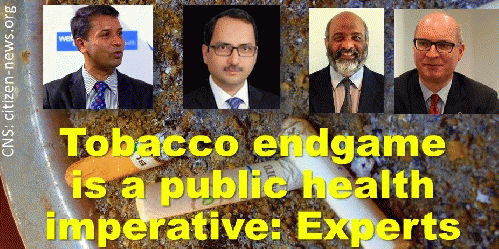
Experts believe tobacco endgame is possible
(Image by Citizen News Service - CNS: citizen-news.org) Details DMCA
Health consequences of tobacco use
In early 2014, the U.S. Surgeon General released a report which expanded the list of smoking-related illnesses. While lung cancer and heart disease remain the mainstays, diabetes, colorectal and liver cancers, ectopic pregnancy and TB have been added.
Professor (Dr) Rishi Sethi of the Cardiology Department of King George's Medical University said that in his hospital the daily average OPD patient load for cardiovascular diseases (CVDs) is growing annually by 25%-30%. A significant number of these patients are below 40 years, and most have no conventional risk factor such as diabetes or hypertension. But tobacco use is common in all his patients. Thus tobacco is an important, even though preventable, risk factor for cardiovascular diseases--the no.1 killer disease today.
According to Dr Sethi, "Chemicals in cigarette smoke cause cells in the blood vessels' lining to become swollen and inflamed. This narrows the blood vessels and can lead to many CVDs like coronary heart disease, stroke, peripheral arterial disease, etc. Even as it is not known exactly which smokers will develop CVD, the best thing for all smokers to do for their heart is to quit. Within one year of quitting, the risk of heart attack drops dramatically, and even those who have already had a heart attack can cut their risk of having another one if they quit."
Tobacco: common risk factor for killer NCDs
At the last World Conference on Tobacco or Health held in March 2015 in Abu Dhabi, Jose Luis Castro, Executive Director of the International Union Against Tuberculosis and Lung Disease, (The Union) stressed upon focusing on the impact of tobacco control on non-communicable diseases (NCDs). It was for the first time that a world conference on tobacco control discussed at length not only about tobacco control policies but also about NCDs. Jose said that, "Link between tobacco use and NCDs is clearly established. This is an important year as we are going to adopt the sustainable development goals (SDGs) in September 2015. So discussions addressing the risk factors for NCDs, of which tobacco use is a major one, are important for setting the global agenda for the next 15 years. Tobacco affects not only the health but also the economic development of countries. Tobacco industry interference in the political systems also destabilizes the efforts of governments to ensure health of its citizens."
Stopping illicit tobacco trade
(Note: You can view every article as one long page if you sign up as an Advocate Member, or higher).





